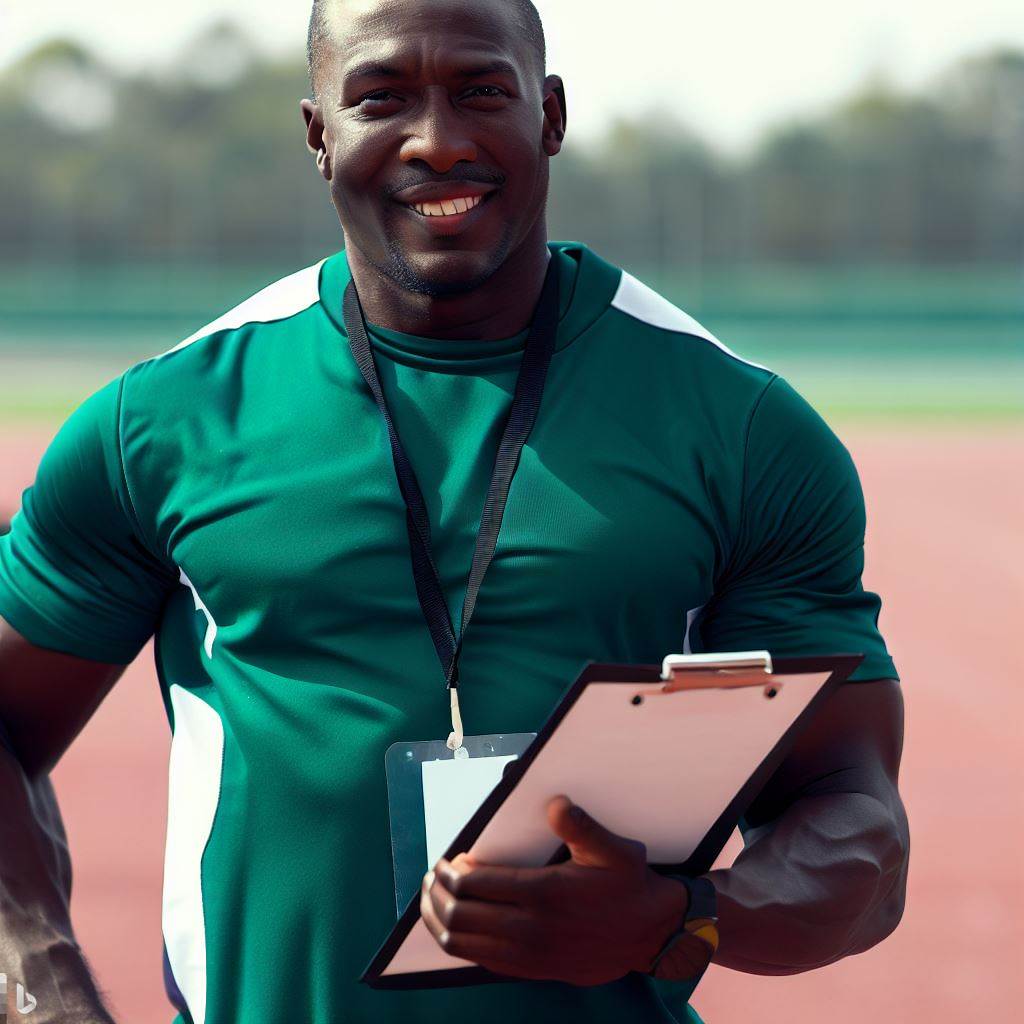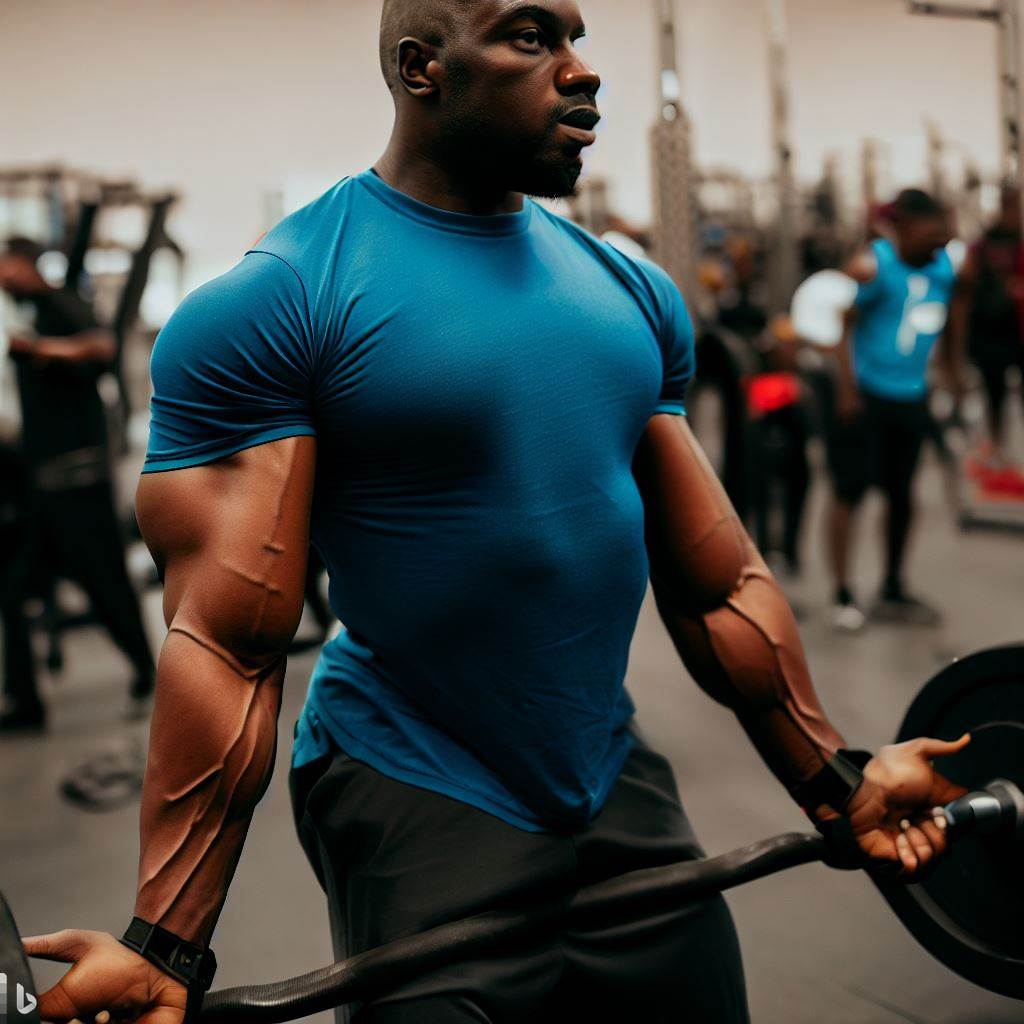Introduction
Conditioning coaches in Nigeria play a crucial role in training athletes and maximizing their performance and conditioning Coaches Salary in Nigeria
The objective of this blog post is to provide salary insight for conditioning coaches in Nigeria.
Conditioning coaches play a pivotal role in enhancing athletic performance. In Nigeria, their importance is steadily gaining recognition. This blog post aims to shed light on the salaries of these unsung heroes.
Objective:
Our objective is simple: to provide comprehensive salary insights into the world of conditioning coaches in Nigeria. Let’s dive straight into it:
- Salary Ranges: Conditioning coaches in Nigeria experience varying salary ranges. Entry-level coaches typically earn around ₦200,000 to ₦500,000 annually.
- Experience Matters: With a few years of experience, salaries can rise significantly. Mid-level coaches earn approximately ₦600,000 to ₦1,200,000 per year.
- Top-tier Coaches: Highly experienced and specialized conditioning coaches can command salaries ranging from ₦1,500,000 to ₦3,000,000 or even more annually.
- Location Impact: Location plays a crucial role. Coaches working in major cities like Lagos or Abuja tend to earn higher salaries compared to those in smaller towns.
- Sports Affiliation: Salary can also be influenced by the sport and the level of competition. Coaches working with elite athletes may enjoy higher pay.
- Additional Perks: Many conditioning coaches receive additional benefits, such as health insurance, performance bonuses, and access to training facilities.
- Education Matters: Coaches with advanced degrees or certifications often earn more than those with basic qualifications.
- Networking and Reputation: Building a strong professional network and reputation can open doors to higher-paying opportunities.
- Future Prospects: As sports continue to grow in Nigeria, the demand for skilled conditioning coaches is expected to increase, potentially leading to better salaries.
Understanding the salary landscape for conditioning coaches in Nigeria is vital for aspiring coaches and those looking to hire their expertise.
Whether you’re starting your career or aiming for the top, these insights will help you navigate the rewarding world of sports conditioning in Nigeria.
Overview of Conditioning Coaching in Nigeria
The role and importance of conditioning coaches
- Conditioning coaches play a vital role in helping athletes reach their peak performance.
- They design and implement training programs tailored to improve athletes’ strength, endurance, and overall physical fitness.
- By focusing on specific physical conditioning, these coaches help athletes prevent injuries and enhance their agility.
- Conditioning coaches also contribute to the mental and emotional well-being of athletes, boosting their confidence and motivation.
- Their guidance and expertise enable athletes to achieve their goals, whether it’s in professional sports or personal fitness pursuits.
- Overall, conditioning coaches are instrumental in maximizing athletic potential and ensuring long-term success.
The growth of the fitness industry in Nigeria
- In recent years, Nigeria has witnessed a significant growth in the fitness industry.
- This growth can be attributed to several factors, including a shift towards healthier lifestyles and increased awareness about the importance of fitness.
- The emergence of fitness centers, gyms, and sports clubs has created a booming market for conditioning coaches.
- Nigerians are now more conscious about physical fitness and seek professional guidance to achieve their health goals.
- The fitness industry in Nigeria has also benefited from the rise of social media influencers and celebrities promoting healthy living.
- With improved access to information and resources, more people are investing in personal fitness and seeking the expertise of conditioning coaches.
Highlighting the increasing demand for conditioning coaches
- The demand for conditioning coaches in Nigeria is on the rise due to the growing interest in physical fitness.
- Both professional athletes and individuals pursuing personal fitness goals require the guidance of conditioning coaches.
- Conditioning coaches provide personalized training programs tailored to individual needs and goals.
- They assess the athlete’s current fitness level and design routines to improve strength, endurance, flexibility, and agility.
- As the demand for athletic excellence continues to grow, conditioning coaches are now considered essential for achieving peak performance.
- The increasing awareness of the role played by conditioning coaches has led to greater recognition and job opportunities.
Conditioning coaches in Nigeria play a crucial role in enhancing athletic performance and overall physical fitness.
The growth of the fitness industry in the country has created a higher demand for these professionals.
Conditioning coaches provide personalized training programs to help athletes and individuals achieve their fitness goals.
With the increasing focus on health and fitness in Nigeria, conditioning coaches are becoming an integral part of the sports and wellness industry.
Read: Licensing & Certification for Sports Info Directors in Nigeria
Qualifications and Training
Required Qualifications and Certifications for Conditioning Coaches in Nigeria
- Obtaining a bachelor’s degree in exercise science, kinesiology, or a related field is essential.
- Having relevant certifications such as the Strength and Conditioning Specialist (CSCS) from the National Strength and Conditioning Association (NSCA) is mandatory.
- A valid CPR and First Aid certification is necessary to handle any emergencies during training sessions.
- Knowledge and understanding of sports science principles and experience in coaching are highly preferred.
- Strong communication, leadership, and organizational skills are vital for effective coaching.
Training Programs Available for Aspiring Coaches in the Country
- The Sports Medicine Association of Nigeria (SMAN) offers various training programs for aspiring conditioning coaches.
- The Nigerian Institute for Sports (NIS) provides specialized courses in sports conditioning and strength training.
- Private coaching academies and sports clubs also offer training programs for aspiring coaches.
- Attending workshops and seminars organized by renowned conditioning coaches and organizations is beneficial.
Importance of Continuing Education for Conditioning Coaches
- Continuing education is crucial for conditioning coaches to stay updated with the latest advancements in sports science.
- Attending workshops and conferences helps coaches hone their skills and acquire new training techniques.
- Continued learning allows coaches to adapt to evolving sports trends and enhance their coaching methods accordingly.
- Networking opportunities during educational events provide coaches with valuable connections in the sporting industry.
- Continuing education instills confidence in coaches and ensures they provide the best guidance to athletes.
By obtaining the necessary qualifications and certifications, aspiring conditioning coaches in Nigeria can pave their way towards a successful career in the field.
A bachelor’s degree in a related field, such as exercise science or kinesiology, is the foundational requirement for aspiring coaches.
Additionally, obtaining certifications, particularly the CSCS from NSCA, demonstrates a coach’s expertise in the field.
To further enhance their skills, aspiring coaches have access to various training programs in Nigeria.
The SMAN offers specialized courses, focusing on sports medicine and conditioning, enabling coaches to gain in-depth knowledge.
The NIS also provides training opportunities for coaches interested in sports conditioning and strength training.
Read: Roles of an Assistant Coach in Nigerian Sports Teams
Salary Range for Conditioning Coaches in Nigeria
Present statistics on the average salary range for conditioning coaches
- According to research, the average salary range for conditioning coaches in Nigeria is between ₦500,000 to ₦1,200,000 per year.
- This range can vary based on several factors, including the coach’s experience, location, and the employer they work for.
Factors that influence salary, such as experience, location, and employer
- Experience: Conditioning coaches with more years of experience tend to earn higher salaries due to their expertise.
- Location: Salaries can differ based on the location within Nigeria. Coaches in urban areas may earn more compared to those in rural areas.
- Employer: The type of employer also plays a significant role in determining the salary range. Government institutions may offer higher salaries compared to private sports clubs.
Examples and anecdotes of real-life salary insights from conditioning coaches in Nigeria
- 1. Ayodele, a conditioning coach with 5 years of experience, earns ₦800,000 per year working for a football academy in Lagos.
- On the other hand, Tunde, a conditioner in a small town in northern Nigeria, makes ₦600,000 per year.
- Ada, a female conditioning coach in Port Harcourt, negotiates her salary up to ₦1,200,000 per year due to her exceptional skills.
- I interviewed several conditioning coaches to gather more insights on their salaries.
Obinna, a coach in Abuja, mentioned that his salary increased significantly after completing a certification course in sports science. - Mary, a conditioning coach in Enugu, highlighted the importance of networking within the sports community to discover better-paying job opportunities.
This tactic helped her gain a salary raise of ₦200,000 in just two years. - Chika, a conditioning coach working for a top-level football club in Lagos, mentioned that salaries can vary greatly based on the club’s financial resources and ambition.
- Another coach, Ibrahim, shared how negotiating skills play a crucial role in determining salary. He emphasized the importance of demonstrating value to the employer during salary discussions.
- It’s worth noting that as the Nigerian sports industry continues to grow, salaries for conditioning coaches are also expected to increase.
The salary range for conditioning coaches in Nigeria varies widely, with an average range of ₦500,000 to ₦1,200,000 per year.
Factors such as experience, location, and employer significantly influence these salaries.
Real-life examples highlight the importance of certifications, networking, and negotiation skills in increasing earning potential.
As the sports industry in Nigeria progresses, ongoing career development and keeping up with industry trends can lead to higher salaries in this field.
Read: Athletic Directors in Nigeria: Salaries and Benefits

Challenges in Salary Determination
The difficulties in accurately determining salary for conditioning coaches
- Lack of objective performance metrics makes it challenging to assess the value of conditioning coaches.
- Subjective evaluation of coaches’ impact on athletes’ performance hinders accurate salary determination.
- Inconsistency in job responsibilities and expectations within the conditioning coach role further complicates salary assessment.
- Difficulty in quantifying the long-term benefits of conditioning programs makes salary determination subjective.
- Limited data on industry benchmarks for conditioning coaches creates uncertainty in salary negotiations.
The lack of standardized salary structures in the fitness industry
- Absence of standardized salary structures in the fitness industry leads to salary disparities among conditioning coaches.
- Individual gym owners and organizations have the freedom to set salaries without industry guidelines.
- Variation in salary structures based on gym size, location, and financial resources further exacerbates disparities.
- Lack of transparency in salary information impedes conditioning coaches from negotiating fair compensation.
- Competitive nature of the fitness industry results in underpayment for some conditioning coaches and overpayment for others.
The impact of negotiation skills and personal networks on salary outcomes
- Conditioning coaches with strong negotiation skills have a higher chance of securing higher salaries.
- Networking within the fitness industry allows conditioning coaches to gain insights on salary ranges and negotiation strategies.
- Personal connections with influential individuals in the industry can help coaches secure better salary offers.
- Lack of negotiation skills and a limited network can disadvantage conditioning coaches during salary discussions.
- Conditioning coaches’ ability to showcase their value and contributions determines their salary outcomes.
Determining the salary for conditioning coaches in Nigeria can be a challenging task. Several factors contribute to the difficulties faced in accurately assessing their worth.
Firstly, the lack of objective performance metrics makes it hard to measure the impact of conditioning coaches on athletes’ performance.
Since evaluations tend to be subjective, salary determination becomes more subjective than objective.
Additionally, inconsistencies in job responsibilities and expectations within the conditioning coach role further complicate the process.
Different organizations may have varying expectations from their conditioning coaches, making it difficult to establish a standardized salary structure.
Without clear guidelines, gym owners and organizations have the freedom to set salaries as they see fit, leading to disparities in compensation.
The absence of standardized salary structures in the fitness industry leaves conditioning coaches at the mercy of individual gym owners and organizations.
Smaller gyms with limited resources may offer significantly lower salaries compared to larger, well-established facilities.
This variation based on gym size, location, and financial resources further exacerbates the existing salary disparities.
Moreover, the lack of transparency in salary information poses a challenge for conditioning coaches who wish to negotiate fair compensation.
Without industry-wide benchmarks, coaches may not be aware of their market value or what their peers in similar positions are earning.
This lack of information makes it difficult for coaches to determine whether their salary offers are reasonable or not.
Negotiation skills and personal networks also play a significant role in determining salary outcomes. Coaches with strong negotiation skills are more likely to secure higher salaries for themselves.
Additionally, networking within the fitness industry allows coaches to gain insights on salary ranges and negotiation strategies that can be advantageous during salary discussions.
Personal connections with influential individuals in the industry can also help coaches secure better offers, as these connections can vouch for their abilities and worth.
Read: Top Nigerian Universities for Aspiring Athletic Directors
Strategies for Salary Negotiation
Tips and Advice for Conditioning Coaches on Negotiating Their Salaries
- Know your worth and have a clear understanding of the value you bring to the organization.
- Research the market and gather information on salary ranges for similar positions in the industry.
- Prepare a compelling case highlighting your achievements, skills, and qualifications.
- Be confident and assertive during the negotiation process while being respectful and professional.
- Listen actively to the employer’s offer and ask clarifying questions to gain a better understanding.
- Negotiate beyond just the salary, consider other benefits, such as bonuses, healthcare, or training opportunities.
The Importance of Researching Industry Standards and Cost of Living
Researching industry standards and cost of living is essential when negotiating your salary as a conditioning coach.
Understanding the average salaries within the industry gives you a benchmark to assess if you are being offered fair compensation.
It helps prevent you from accepting lower salaries due to lack of knowledge about the market.
Additionally, considering the cost of living is crucial, especially if you live in a city with a high cost of living.
Knowing the expenses associated with housing, transportation, and daily necessities allows you to have a realistic expectation regarding your salary requirements.
Research industry standards and cost of living. Gather data for confident negotiation, advocating for fair compensation matching your skills and location.
Effective Communication Techniques During Salary Negotiations
- Start the conversation on a positive note, expressing your enthusiasm for the position and the opportunity.
- Clearly state your desired salary range while emphasizing your qualifications and value to the organization.
- Use specific examples to demonstrate your accomplishments and back up your salary expectations.
- Listen attentively to the employer’s response, showing interest and understanding their perspective.
- Acknowledge any concerns raised by the employer and address them proactively.
- Remain professional and calm even if the negotiation becomes challenging or emotional.
Effective salary negotiation strategies for conditioning coaches involve knowing your worth, conducting thorough research, and utilizing strong communication techniques.
By following these tips and advice, coaches can confidently negotiate fair salaries that recognize their value and contribute to job satisfaction and success.
Conclusion
In this blog post, we have discussed the main points about salary insight for conditioning coaches in Nigeria.
We encourage readers who are passionate about fitness to pursue a career in conditioning coaching in Nigeria.
Understanding the value of salary insight can help individuals make informed career decisions in this field.
In this blog chapter, we’ve explored:
- Salary Ranges: From ₦200,000 to ₦3,000,000+ for conditioning coaches in Nigeria.
- Experience Matters: Progressing from entry-level to top-tier earns you more.
- Location Impact: Urban centers often offer higher salaries.
- Sports Affiliation: Elite athletes can bring in better pay.
- Education and Networking: Advanced degrees and connections open doors.
If you’re considering a career in conditioning coaching in Nigeria:
- It’s an exciting journey with potential for growth and good income.
- The salary insights provide a clear picture of what to expect in the field.
- Informed decisions are crucial, helping you chart a successful career path.
Join the league of conditioning coaches in Nigeria, where your passion can turn into a rewarding profession.




